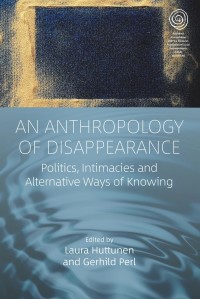‘Who Has Taken My Son?’: Pervasive Missingness, Custodial Disappearances and Revolutionary Violence in Urban India
 Associate Professor Atreyee Sen has contributed the chapter ‘Who Has Taken My Son (Amar Cheleke Ke Nilo)?’: Pervasive Missingness, Custodial Disappearances and Revolutionary Violence in Urban India to the book An Anthropology of Disappearance, edited by Laura Huttunen and Gerhild Perl.
Associate Professor Atreyee Sen has contributed the chapter ‘Who Has Taken My Son (Amar Cheleke Ke Nilo)?’: Pervasive Missingness, Custodial Disappearances and Revolutionary Violence in Urban India to the book An Anthropology of Disappearance, edited by Laura Huttunen and Gerhild Perl.
All over the world, people disappear from their families, communities and the state’s bureaucratic gaze, as victims of oppressive regimes or while migrating along clandestine routes. This volume brings together scholars who engage ethnographically with such disappearances in various cultural, social and political contexts. It takes an anthropological perspective on questions about human life and death, absence and presence, rituals and mourning, liminality and structures, citizenship and personhood as well as agency and power. The chapters explore the political dimension of disappearances and address methodological, epistemological and ethical challenges of researching disappearances and the disappeared.
Atreyee Sen's chapter traces the affective life of a police file – a missing person’s complaint registered by 85-year-old Shanta, whose 14-year-old son disappeared in Calcutta, a city in eastern India, in 1974. Sen analyses the afflicted engagements, dynamics of absence and extraordinary memories of ordinary women who encounter the fallout of state kidnappings, custodial deaths, disappearances and the sudden absence of politicized youth, all of which often characterize regions marked by anti-state guerrilla movements.
Read more about the book on De Gruyter's website: An Anthropology of Disappearance.
